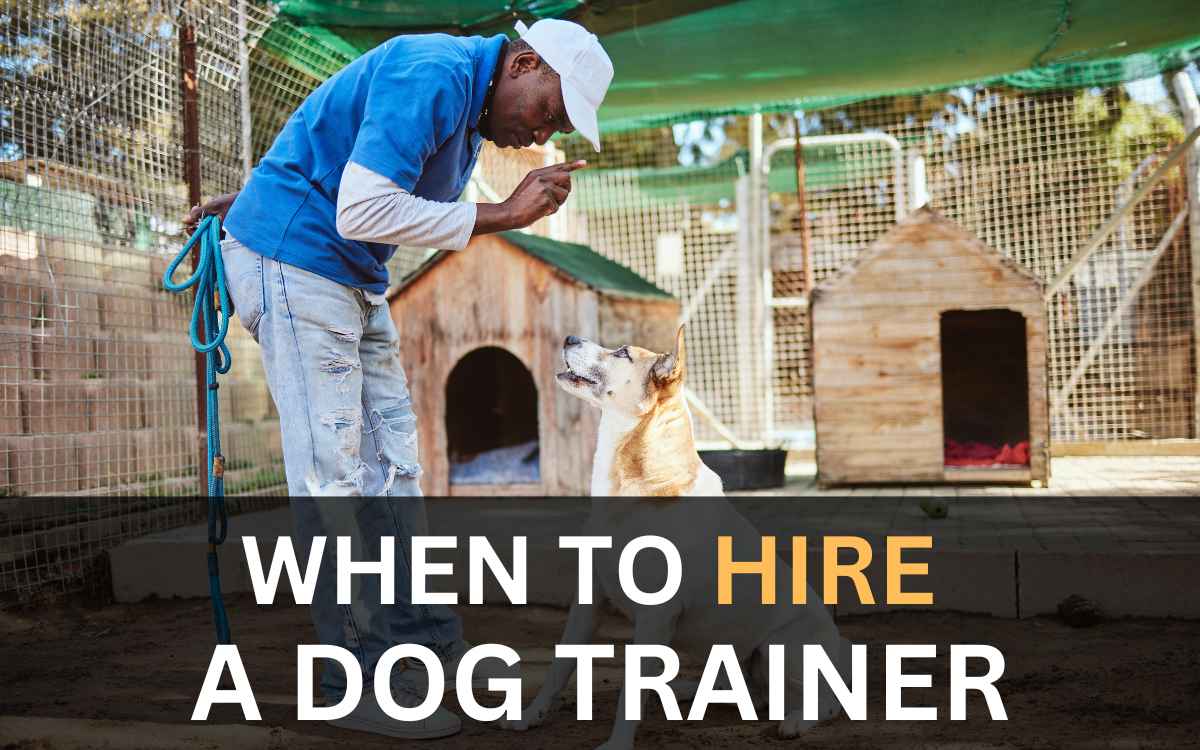In this article, we will explore the signs when to hire a dog trainer, as well as the benefits of doing so. Get ready to say goodbye to those pesky behavior problems and hello to a well-behaved furry companion.
Are you tired of coming home to chewed-up shoes and shredded couch cushions? Is your dog’s barking driving your neighbors crazy? It may be time to consider hiring a dog trainer. While it’s easy to assume that training a dog is something you can handle on your own, the truth is that sometimes we all need a little professional help.
There are several situations in which it may be beneficial to hire a dog trainer. Firstly, if you have recently adopted a new puppy or adult dog, a trainer can help with basic obedience training and socialization. They can teach your dog commands such as sit, stay, and come, as well as help them learn how to interact with other dogs and people.
Table of Contents
Why hiring a dog trainer can be beneficial
Hiring a dog trainer can be incredibly beneficial for both you and your furry friend. A professional dog trainer has the knowledge and expertise to understand canine behavior and psychology. They can assess your dog’s unique needs and develop a customized training plan to address any behavioral issues or challenges.
Behavioral issues: Identifying when professional help is needed
One key indicator is the severity of the behavior problem. If your dog’s behavior poses a risk to their safety or the safety of others, seeking professional help is highly recommended. This includes aggressive behaviors such as biting, growling, or lunging at people or other animals.
Training difficulties: Knowing when DIY isn’t working
Knowing when DIY isn’t working for dog training can be challenging, but there are a few signs to look out for. First, if you have been consistently trying to train your dog for an extended period of time and they are not making any progress or seem to be regressing, it may be time to consider seeking professional help.
A professional dog trainer will have the experience and knowledge to assess the situation and provide effective training techniques tailored to your dog’s specific needs.
Specific needs: Catering to individual dog requirements
It is important to cater to the specific needs of each individual dog. Just like humans, dogs have different personalities, temperaments, and learning styles. Some dogs may respond well to positive reinforcement methods, while others may require a firmer approach.
One key aspect of catering to individual dog requirements is understanding their breed and breed-specific traits. Certain breeds have unique characteristics that may influence their training needs.
For example, herding breeds like Border Collies may require mental stimulation and tasks to keep them engaged, while more independent breeds like Huskies may need consistent leadership and boundaries.
Time constraints: Seeking assistance for busy dog owners
For busy dog owners who are struggling to find time to properly care for their pets, there are several options available to seek assistance. One option is to hire a dog walker or pet sitter who can come by during the day to take your dog for a walk and provide some companionship.
This can help ensure that your furry friend gets the exercise and attention they need, even when you’re unable to be there.
Safety concerns: Addressing aggressive or dangerous behavior
When it comes to addressing aggressive or dangerous behavior in dog training, safety should always be the top priority.
It is crucial to approach these situations cautiously and seek professional help if needed. A certified dog trainer or animal behaviorist can provide the expertise and guidance necessary to address specific behavior issues and ensure the safety of both the dog and the people involved.
Conclusion: The benefits of hiring a dog trainer
In conclusion, hiring a dog trainer can provide numerous benefits for both you and your furry companion. A professional dog trainer has the knowledge and expertise to address specific behavioral issues and create a personalized training plan.
This can lead to a happier and healthier relationship between you and your dog. Additionally, working with a dog trainer can save you time and frustration by providing effective training techniques and guidance.
Ultimately, investing in a dog trainer is an investment in your dog’s well-being and your own peace of mind. Don’t hesitate to seek out the help of a professional to ensure that you and your dog have the best possible bond. Take the first step towards a well-trained pup today!
Also, Read this article. Where can I drop my dog off for training.
FAQS
What is the best age to hire a dog trainer?
The best age to hire a dog trainer can vary depending on the specific needs and behavior of your dog. Generally, it is recommended to start training your dog as early as possible, ideally around 8-16 weeks of age. This is known as the critical period for socialization and learning in puppies. During this time, they are more receptive to new experiences and can quickly learn basic obedience commands and proper behavior.
How do I know if my dog needs a trainer?
There are a few signs that may indicate your dog could benefit from the help of a professional trainer. If your dog displays aggressive behavior towards people or other animals, it is important to seek the guidance of a trainer who can address this issue and ensure everyone’s safety.
Should you hire a trainer for your dog?
Yes, hiring a trainer for your dog can be incredibly beneficial. Trainers are experienced professionals who have the knowledge and skills to effectively train your dog. They can help address behavioral issues, teach basic obedience commands, and even assist with more advanced training techniques.
Is it better to train your dog yourself or a trainer?
The decision of whether to train your dog yourself or hire a professional trainer ultimately depends on your individual circumstances and preferences. Training your dog yourself can be a rewarding experience that strengthens the bond between you and your pet. It allows you to have complete control over the training process and tailor it to suit your dog’s specific needs. However, it requires time, patience, and consistency on your part.










